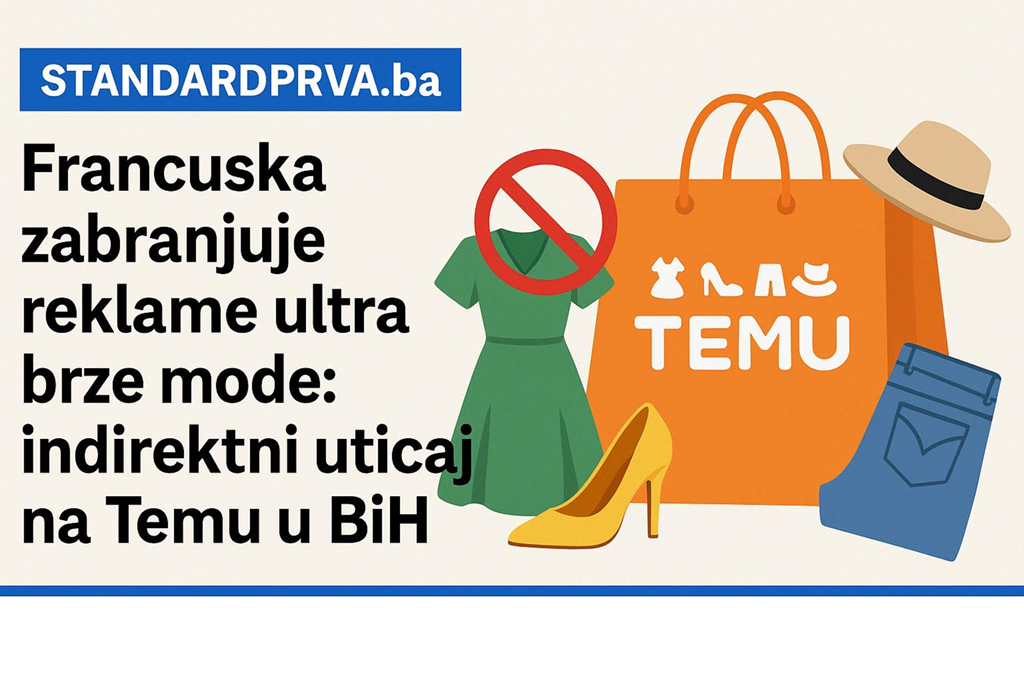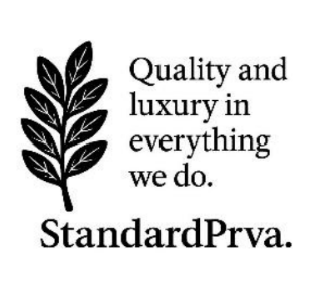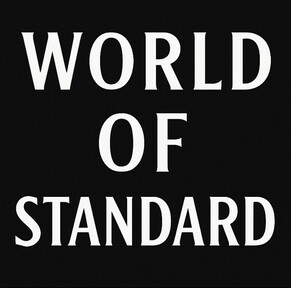France Bans "Ultra" Fast Fashion Advertising: Indirect Impact on Temu in Bosnia and Herzegovina
16.06.2025French Law Against "Ultra" Fast Fashion
France has taken a pioneering step in the fight against "ultra" fast fashion—a phenomenon characterized by the extremely rapid and low-cost release of clothing, as practiced by online giants such as Shein and Temu. In June 2025, the French Senate passed a bill banning advertising of "ultra" fast fashion throughout France. This legislation, unanimously supported in both the National Assembly and the Senate, is part of a broader initiative to reduce the environmental impact of the fashion industry and to curb the "invasion of cheap, ultra-disposable clothing" from China. The law introduces a series of measures: penalties for polluting companies, an advertising ban, special obligations for online platforms, and even sanctions for influencers who promote this type of content. As French Ecology Minister Agnès Pannier-Runacher emphasized, the goal is twofold—protecting the environment and supporting domestic retail. This initiative aims to soften the harmful impact of "disposable" fashion on the climate and society, while also protecting traditional European fashion chains from the unchecked competition of ultrafast Chinese rivals.
A key provision of this law is a complete ban on advertising for companies engaged in "ultra" fast fashion (referred to as mode ultra-éphémère). This ban was initially removed during committee discussions under lobbying pressure but was reinstated in the final version of the bill. This means that Shein, Temu, and similar platforms will no longer be able to promote themselves through traditional ads in France, and penalties are planned for influencers who promote them indirectly. Additionally, the law introduces environmental fees and restrictions—for example, a special tax of 2 to 4 euros will be applied to every package under 2 kg shipped from outside the EU, aimed at discouraging mass small shipments that are characteristic of the Temu/Shein model. The law also eliminates tax deductions that fashion companies previously received for donating unsold stock, to prevent textile "waste" from being rewarded with tax breaks.
Furthermore, platforms will be obligated to be transparent and to educate consumers about the environmental impact of fashion—for example, they must warn buyers about the ecological footprint of products and encourage repair over disposal. Although the final implementation is expected after a joint committee aligns the law’s details (expected by the end of 2025), it is already clear that this French law will set a precedent within the EU.
A Protective Approach Toward European Brands
Interestingly, during the legislative process, distinctions were made between "ultra" fast fashion and "classic" fast fashion to spare European fashion chains from the strictest measures. In the final version, the definition of targeted "ultra-fast" fashion was intentionally narrowed—by adding the qualifier “ultra”—to specifically target new Chinese players while exempting traditional lower-price brands. According to the French government, the goal is to “address new players […] not traditional affordable clothing manufacturers.” In practice, this means that giants like Zara, H&M, Primark, Kiabi, Decathlon, and others—although also representatives of fast fashion—are not affected by the advertising ban. Instead, the restrictions primarily target Shein, Temu, and other Chinese platforms.
This approach is no coincidence; lobbying by European fashion companies played a major role in “softening” the law. Industry representatives exerted strong pressure on lawmakers, emphasizing that European firms employ local workers, pay taxes, and help maintain vibrant urban retail environments. For example, the director of Primark France stressed that their businesses, unlike the Chinese platforms, operate under French law and quality standards, contributing to the national economy. One senator openly declared: “I don’t want this law to harm our companies like Decathlon or Kiabi by a single cent,” highlighting their importance to local consumers of all ages.
As a result of such lobbying, the law’s scope has been narrowed—environmental groups argue that the text has been “gutted” and essentially turned into an “anti-Shein” law with limited reach. Even the government acknowledges that the definition of “ultra” fast fashion remains intentionally vague and that criteria—such as an extremely broad assortment and the lack of product repairability—will only be specified later through executive decrees to distinguish ultra-fast fashion from regular fast fashion.
This differentiation between Chinese online sellers and European retail chains is seen by many as a protective, even protectionist measure. One international analysis called the legislation a move that “bears the mark of protectionism,” as it creates separate categories of “ultra” and “classic” fast fashion—the former applying to Chinese companies, the latter covering European retailers. In other words, the legal blow is aimed at external competitors, while domestic and European brands are shielded. The French government does not hide that it aims to give domestic textile industries more space; Minister Pannier-Runacher called the law “a unique opportunity for European countries to reposition themselves in the textile market,” hinting at a partial return of production and sales to European soil.
Regulatory, Reputational, and Market Pressures on Temu
France’s decision sends a strong signal that could indirectly affect Temu and similar platforms on multiple fronts. First, there is regulatory pressure: although the law applies only within France, its message reflects a broader sentiment across the EU. Even before this law, European regulators had intensified oversight of platforms like Temu and Shein. In November 2024, the European Commission officially warned Temu to correct violations of consumer rights—such as fake discounts, false urgency messages, unclear contest rules, and insufficient information about return policies—or face serious fines. This investigation was conducted jointly by consumer protection agencies from Belgium, Germany, and Ireland, showing that Temu’s operations are under coordinated scrutiny at the EU level.
In other words, Temu is already “on the radar” of European regulators due to its business practices, and the French advertising ban further increases the pressure.
Furthermore, chain reactions in other countries are possible.
France often takes the lead in regulating markets (recall earlier bans on fossil fuel advertisements, plastic restrictions, etc.), so it's not unlikely that other EU countries will consider similar measures. If the trend of banning advertising were to spread, Temu could find itself in a position where it is virtually unable to publicly promote its services across Europe, forcing it to rely on guerrilla marketing and word-of-mouth promotion. Even if new bans do not emerge immediately, trade associations are already applying pressure: in early June 2025, the French retail associations (CDCF and CCF) sent an open letter to the government calling for even stricter measures against Temu, Shein, and AliExpress. They cited alarming data showing that 85–95% of products on these platforms do not meet EU standards. The associations urged the authorities to use all legal means – including the complete blocking of those websites – to protect consumers and domestic retailers. This "declaration of war" from domestic traders shows that market pressure on Temu is increasing: European rivals see it as a threat and are prepared to resort to legal tools to slow it down or remove it from the market.
From a reputational perspective, being explicitly named in French law and media as an example of unsustainable, excessive fast fashion carries negative consequences. Temu’s image may suffer as it becomes associated with low-quality, almost disposable products and unethical practices. In French public opinion (and more broadly across the EU), a perception is forming that such platforms are harmful – environmentally (due to waste accumulation and the carbon footprint of fast fashion) and socially (due to potential labor exploitation and undermining of local businesses). These criticisms are not confined to France: the news about the advertising ban on Shein and Temu has resonated in global business circles and media. Consumers in Bosnia and Herzegovina, especially those more environmentally and socially conscious or connected to European trends, might also begin to reconsider their purchases on Temu knowing about these controversies. Local media have already started to relay these concerns: highlighting that products from Temu may not meet the quality standards prescribed in BiH and that there is no verification of the health impact of materials. Such reports may undermine a portion of the public’s trust in the safety and quality of these ultra-cheap products.
Moreover, economists warn about the consequences of the boom of global platforms like Temu on the local economy. Temu and similar services divert spending away from domestic shops, which could, in the long run, jeopardize local retail. In Bosnia and Herzegovina, there has been no regulatory response to this phenomenon so far, but if domestic retailers and manufacturers feel a more serious blow, they might request protection from the authorities similar to what French retailers have achieved. This could mean the gradual introduction of stricter rules: for example, lowering the high threshold for duty-free imports, stricter quality control of imported packages, or requirements for compliance with EU standards. It is important to note that BiH, as a country aspiring to EU membership, is gradually aligning its regulations with those of the EU – so e-commerce and consumer protection rules may also become stricter. One concrete example is the VAT/customs threshold: currently, in BiH, shipments valued under 300 BAM are exempt from import duties, while in the EU, VAT is charged on all imports (there are no exemptions for small parcels). If BiH adopts a similar regime, products from Temu would become more expensive for the end customer, reducing their competitive edge. In short, regulatory winds blowing from Europe could reach BiH as well, which would force Temu to adapt or risk losing part of the market.
Temu in Bosnia and Herzegovina: Presence and Popularity
Illustration: The rapid rise of Temu on the Bosnian market has led to a massive influx of small parcels from China. Nearly half a million orders arrived in BiH through Temu in just a few months of 2024.
The Temu platform achieved a notable breakthrough in the Bosnian market in the second half of 2024, as shown by concrete figures. Thanks to an aggressive advertising campaign on social media and the internet, Temu attracted tens of thousands of Bosnian buyers. From September to December 2024, as many as 468,975 orders from Temu arrived in BiH. That’s nearly half a million packages in just a few months – an impressive figure for a market the size of Bosnia and Herzegovina. According to data from the Indirect Taxation Authority (ITA) of BiH, these packages were distributed throughout the country: for example, over 180,000 parcels were processed at the Banja Luka customs office, 129,000 in Gradiška, about 73,000 in Sarajevo, etc. The average parcel value was under 100 BAM. Most shipments fall into the category of “low-value goods” – individually mostly ranging from 90 to 300 BAM – which means they are exempt from paying customs duties and VAT under current laws. Leveraging this advantage, Temu won over cost-conscious buyers with prices that local stores can hardly match.
The distribution model sends goods directly from China to end customers in BiH. In practice, ordered items are shipped in bulk to BiH (often by air freight to the nearest logistics hubs), go through customs clearance at main points (Sarajevo, Banja Luka, Gradiška, etc.), and are then handed over to the local postal service or couriers for final delivery. A key factor in Temu’s appeal – apart from price – is the relatively fast delivery time for a transoceanic source. User experiences show that packages from China via Temu are delivered in 10 to 15 days on average, and sometimes even faster. Many buyers on forums report receiving orders within two weeks, which is faster than with earlier generations of Chinese e-shops (e.g., AliExpress used to take months). Temu clearly relies on efficient logistics chains and possibly warehouses near Europe to speed up delivery.
There is basic localization of the service for the BiH market. Although Temu has no registered company or physical presence in Bosnia and Herzegovina, the platform tailors its offering to Bosnian buyers: on its mobile app and website, Bosnia and Herzegovina can be selected as the destination country, prices are shown in Convertible Marks (BAM), and free shipping or coupons expressed in BAM are often offered – which confirms that this market is being specifically targeted. The website itself is in English (with no Bosnian language localization for now), but the interface is simple, and many users manage via other customers’ reviews. There are also guides on websites and YouTube explaining how to order from Temu to BiH, indicating growing interest and a user base expanding beyond just tech-savvy consumers.
The brand’s popularity in BiH is especially notable among younger people and bargain hunters. On local forums, buyers mostly share positive experiences: many say they’ve equipped themselves or their households with all sorts of items – from clothing and cosmetics to tools, car accessories, and toys – for a few hundred BAM, at prices significantly lower than in local stores. Some users admit to spending 500 BAM or more on Temu across several orders, with only occasional disappointments in product quality. This combination of a wide assortment and low prices builds a certain customer loyalty, with Temu seen as an “online bazaar” where everything can be found cheaper. Moreover, buyers compare Temu with competitor platforms: they note that shipping is often free and faster, whereas AliExpress now sometimes charges expensive shipping, making the final price higher. Temu is thus building a brand recognized for affordability, supported by viral marketing (e.g., “spin the wheel” games in the app, referral bonuses, and similar tactics). Still, it’s worth noting that concerns about product quality and safety remain – some users themselves warn about issues (e.g., caution with poorly insulated electronics, mostly polyester fabrics in clothing) – but so far this has not slowed down Temu’s growing popularity.
Indirect Impact of the French Move on Temu in Bosnia and Herzegovina
Although Bosnia and Herzegovina is outside the jurisdiction of the European Union, decisions such as France’s ban on advertisements for “ultra” fast fashion can have indirect effects on the operations of companies like Temu and their environment in BiH. Here are several key aspects:
Regulatory signal:
France has clearly signaled that the business model of Shein and Temu is considered problematic for society and the economy. This could encourage a broader regulatory trend – even before formal accession, BiH often follows EU standards as part of its integration process. If the EU continues to tighten rules for the “ultra-fast fashion” sector, it is possible that BiH will consider certain measures to align with them or protect domestic interests. This could mean, for example, lowering the 300 BAM threshold for duty-free imports, introducing mandatory labeling of material content for health safety, or intensified inspections of incoming products. There are already signs of increased attention – media reports suggest that relevant authorities could use existing consumer protection laws to block deliveries of products that fail to meet standards. If, hypothetically, BiH inspections were to begin returning or destroying unsafe products from these shipments, it would seriously undermine the profitability of Temu’s model.
Impact on company strategy:
Facing hostile measures in major markets like France, Temu may shift its focus to non-EU countries where such restrictions do not (yet) exist. This could mean an increased presence in the Balkan region, including BiH, as an important emerging market. On the one hand, this means Temu is likely to continue offering attractive incentives to retain and grow its user base (e.g., even more aggressive discounts, marketing through local influencers or social media). On the other hand, if Temu is forced to raise its global standards (e.g., verify suppliers for quality, display prices and discounts more transparently, respect consumer rights), those positive effects would spill over to users in BiH as well. In fact, any adjustment Temu makes to comply with EU rules – whether it’s clearer product labeling, better customer support, or improved chemical safety – will indirectly improve the experience for BiH customers. However, if Temu chooses to ignore the warnings, it risks drastic moves from the EU, such as a total platform ban (which French authorities have indicated as an option). In such a scenario, even users in BiH might find themselves cut off from the platform (if Temu is forced to restrict shipments to the European region to avoid sanctions).
Brand reputation and public perception:
A state’s decision to ban advertisements for a brand inevitably sends a message to consumers elsewhere. France’s ad ban for Temu may echo in BiH via media reports and social networks. This could lead part of the public to view Temu as an “undesirable” or “problematic” brand. We’re already seeing domestic news portals pick up stories about seized suspicious goods, product recalls (e.g., the withdrawal of a Temu hoodie from the EU market due to injury risk), and so on – all of which tarnish the image of the platform as a carefree shopping destination. In the long run, if consumer awareness of the ecological and ethical impacts of “ultra” fast fashion grows (influenced by European campaigns), Temu could lose part of its user base who no longer want to support such practices. Of course, price remains the decisive factor for many in BiH – but reputational risk means Temu may not be able to expand its customer base beyond those driven solely by price.
Local market pressure:
While retailers raised their voices in France, similar actions may follow in BiH from domestic retail chains and importers suffering from the competition. There are no public initiatives at the moment, but it's easy to imagine that if Temu continues its rapid growth, local traders may call on authorities for protective measures – whether through stricter tax collection or awareness campaigns (“buy local” versus mass import of cheap goods). Local e-commerce platforms could also use Temu’s negative publicity to highlight their own advantages (verified quality, safer shopping, easier returns, etc.), thereby trying to win back some customers. Temu could thus face competitive pressure in the BiH market, not through traditional price wars (which are hard to win), but through arguments of quality and trust.
In conclusion, the French advertising ban on “ultra” fast fashion primarily acts as a regulatory precedent and political message, but its effects go beyond France’s borders. For Temu in Bosnia and Herzegovina, this situation means operating in an increasingly sensitive environment: European trends are not in its favor. In the short term, Temu’s operations in BiH will likely continue as before – demand is high, there are no local legal barriers, and the prices and offerings remain attractive. However, potential changes are looming on the horizon: stricter regulation and the introduction of standards that Temu will have to meet if it wants to retain trust and market access. As the EU introduces new rules on digital commerce and sustainability, BiH will gradually adopt them, and Temu will have to prove it can be a reliable partner under those rules – otherwise, it risks becoming a victim of its own “ultra-fast” growth. The French law, though geographically limited, therefore indirectly increases both regulatory and reputational pressure on Temu everywhere – including in Bosnia and Herzegovina – and will be a key factor in the future development of the brand’s strategy in our market.
Finally, it’s worth noting that accountants and tax advisors can provide full support regarding the import and customs reporting of these types of goods.
References:
Le Figaro/AFP – “Fight against fast fashion: the Senate adopts a bill targeting Shein”, June 10, 2025.
Le Figaro – Details of the law: ban on advertising “ultra-ephemeral fashion”.
Reporterre – “Anti-fast-fashion law: hands off European brands”, June 10, 2025. (analysis of lobbying and legislative amendments).
Siècle Digital – “What the new French law will really change”, June 11, 2025. (law adoption and expectations).
Siècle Digital – “French retailers vs. Shein, Temu, and AliExpress: a shocking letter…”, June 4, 2025. (demands of French retailers, non-compliance of products with EU standards).
Klix.ba – “EU Commission warns Temu to correct consumer protection violations…”, November 8, 2024. (EU investigation against Temu).
Klix.ba – “Chinese products have flooded the BiH market: … half a million orders from Temu”, December 13, 2024. (statistics on orders in BiH, data from the Indirect Taxation Authority).
Klix.ba – Ibid. (distribution of packages across customs branches, shipment values, customs regulations).
Crna-Hronika (reposting Klix) – “500,000 orders arrived from Temu to BiH”, December 13, 2024. (comments on popularity and quality concerns).
Reddit/r_bih – User experiences with ordering from Temu (delivery time ~10–15 days, satisfaction with price/quality), 2023.
/ / /
"Standard Prva" LLC Bijeljina is a company registered in Bijeljina at the District Commercial Court in Bijeljina. Company’s activities are accountancy, repurchases of receivables, angel investing and other related services. Distressed debt is a part of the Group within which the company repurchases the receivables, which function and are not returned regularly.
Lawyer’s Office Stevanović is the leading lawyer’s office in the region with the seat in Bijeljina. The LO abbreviation represents Lawyer’s Office of Vesna Stevanović and Lawyer’s Office of Miloš Stevanović.
Contact for media press@advokati-stevanovic.com or via telephone 00 387 55 230 000 or 00387 55 22 4444.





